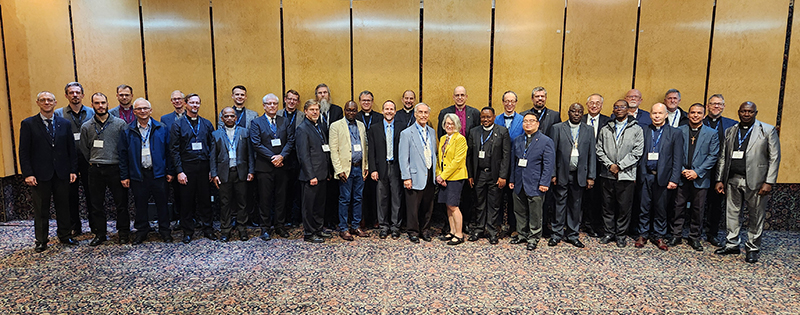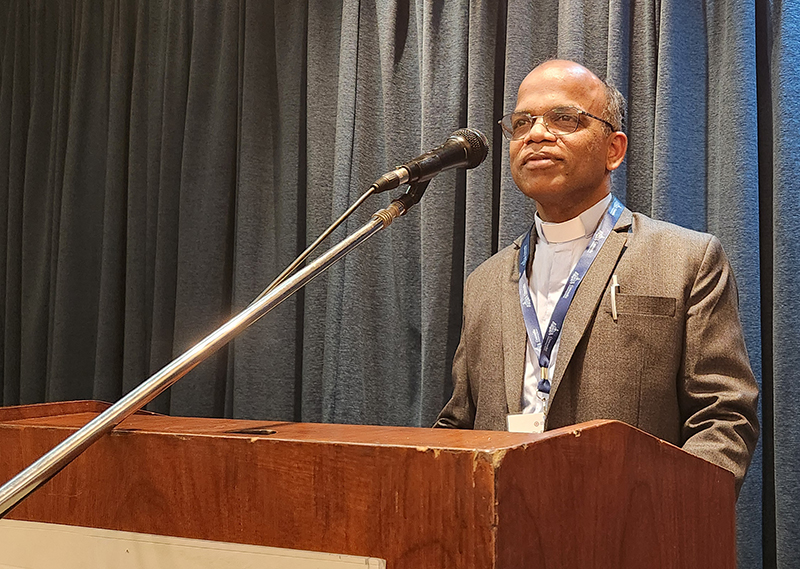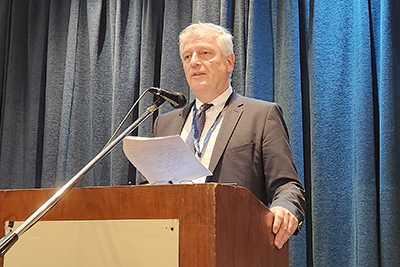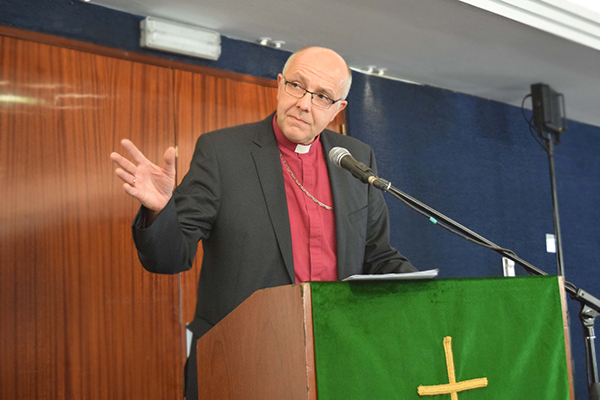
ARGENTINA – The third day of the International Lutheran Council’s 2024 World Seminaries Conference saw participants consider the theme of state and church in nations where Christians are the victims of hostility and violence.
The day began with a service of Matins, with Rev. Dr. P. R. Selvaraj preaching. Dr. Selvaraj, who is Principal of India’s Concordia Theological Seminary, Nagercoil, also served as the first speaker of the day, discussing the challenges facing Christianity in India. “India is a secular country,” Dr. Selvaraj explained, and India’s Constitution “guarantees freedom of religion to all persons in India”—including “freedom of conscience and the right to ‘profess, practice, and propagate’ religion.” But beginning in the 1980s, there arose an ideological movement known as Hindutva, which encourages “the cultural justification of Hindu nationalism and the belief in establishing Hindu hegemony within India.” Proponents of Hindutva desire “to create a Hindu nation” and “eliminate all those factions that do not fit in its grand design.”
For this reason, Hindutva strongly opposes conversion. “The policy of the State is to prevent by law forced or induced religious conversions,” Dr. Selvaraj explained. And “the connotation of ‘inducement for this purpose is quite large.” Measures to prevent conversion from Hinduism to Christianity include anti-conversion laws in a number of states, re-conversion movements, and even violent persecution. “Mobs have vandalized churches, attacked missionary schools, disrupted prayer meetings, and assaulted pastors and practicing Christians, accusing them of forced conversions,” Dr. Selvaraj noted. “Survivors and activists say authorities have failed to investigate these incidents, often filing charges against the victims themselves, turning a blind eye to the violence.”

Hindutva also “takes issue with Christianity for its theological exclusivism… [in contrast to] the notion of a pluralistic and all-inclusive Hinduism,” Dr. Selvaraj said. But even liberal Christianity, which has shifted its articulation to be more inclusive, is still rejected. “To Hindutva proponents, Christianity—with its exclusive claims—falls short of a superior and more tolerant ‘pluralistic Hinduism.’” As such, it is treated as “a threat to communal harmony and peaceful coexistence.”
Ironically, it is Hindutva which truly poses a threat to India’s multicultural society, Dr. Selvaraj suggested, since it seeks “to create a corporate identity” in India “by assimilating or excluding minorities in order to form a monolithic, homogenous Hindu culture.”
Minority groups often bear the brunt of the violence. For example, state laws against the killing of cows—which are sacred in Hinduism—lead to violence against “people working in the cattle trade and people belonging to minority groups, including Muslims, Dalits, or Adivasi communities.” And false claims of forced conversion under duress are frequently used “as a pretext for violence” against Christians, Dr. Selvaraj noted—“particularly against those of vulnerable groups like Dalits, Adivasis, and women.”
“Any Christian who does convert from Hinduism is most likely to come under intense pressure, or even violence,” Dr. Selvaraj continued. “They can face constant pressure to renounce their new faith, face job loss/discrimination, endure physical assaults, and even be murdered. Church leaders are also in danger in many parts of India as extremists target them (along with their families) to create fear and chaos in the Christian community.”
Several Christian groups have suggested responses to political Hinduism, but Dr. Selvaraj suggested it is best to consider these challenges from a Lutheran understanding of church and state. Christians in India should focus on the church “primarily not as an institution but as a communion of saints brought by Word and Sacraments.” This “equips the Church with a unique vision for its mission,” Dr. Selvaraj said. “It provides a vision to transcend narrow particularisms and embrace multiplicity, differences and plurality both within the Church, and to extend the scope of its vision beyond the boundaries of the Church even to reach out to those who hatch hatred against the Church.”
“The Church should not engage in retaliatory ethics in face of Hindutva violence nor aspire for temporal power,” he continued. But “informed by Luther’s two kingdom theory, the Church while maintaining the proper distinction between the state and spiritual authority, should not be silent but offer a critical voice in the midst of injustice, brokenness and oppression.”
“Luther’s Two Realms doctrine would provide a rich resource in this regard, to further strengthen and refine Indian Christian theological voices in responding to the challenges raised by the Hindutva,” he concluded. “Luther’s understanding of God’s left-hand realm and God’s activity in this realm as our Creator God under whom entire human beings, with all their plurality and heterogeneity, share a common humanity is a good starting point.”
Plenary discussion followed the presentation.
Accreditation and ILC Churches
The rest of the morning was devoted to a discussion of accreditation and its relevance for theological institutions in the International Lutheran Council, a subject upon which delegates had earlier received a written report. Dr. Cynthia Lumley of Westfield House, Cambridge and ILC General Secretary Klaus Detlev Schulz gave brief presentations as a preface to subsequent small-group discussion.
Dr. Lumley introduced the subject, noting that the subject of accreditation was raised during the previous ILC World Seminaries Conference in the Philippines in 2019. In her remarks, Dr. Lumley highlighted the importance of self-evaluation—an important aspect of accreditation processes—as a way of ensuring the continued health of an educational institution. Dr. Lumley went on to sketch what such self-evaluation should look like, explaining how it touches not only on academic matters but also practical aspects of an institution’s operations.
Dr. Schulz explained how the idea of a ILC-led accreditation program was explored following the last World Seminaries Conference, with the ultimate decision made that an ILC accreditation agency should not be pursued at this time. But the process of exploration over the past few years led to the development of helpful reference material that may be used as part of the self-evaluation process by theological institutions in ILC member churches—not as a replacement for national accreditation programs but as a complement, helping to ensure the continued confessional Lutheran nature of individual schools.
The conference then broke into small groups to discuss a series of questions related to accreditation and their schools before reconvening to share their conclusions.
———————
Find more news on the ILC’s 2024 World Seminaries Conference here.




